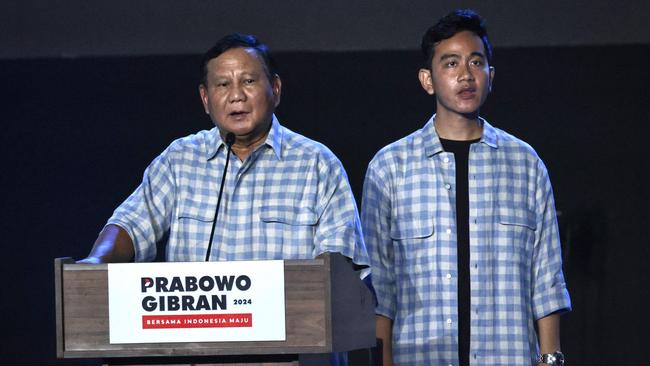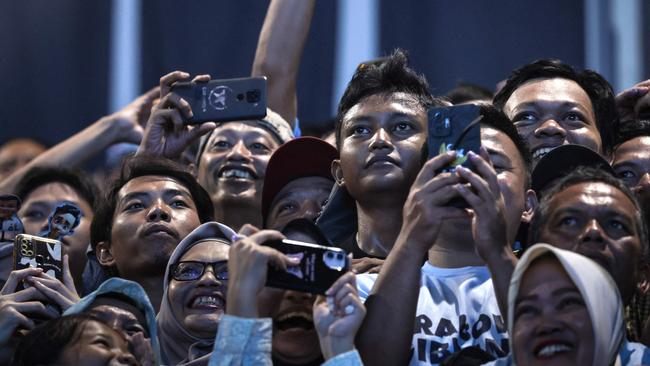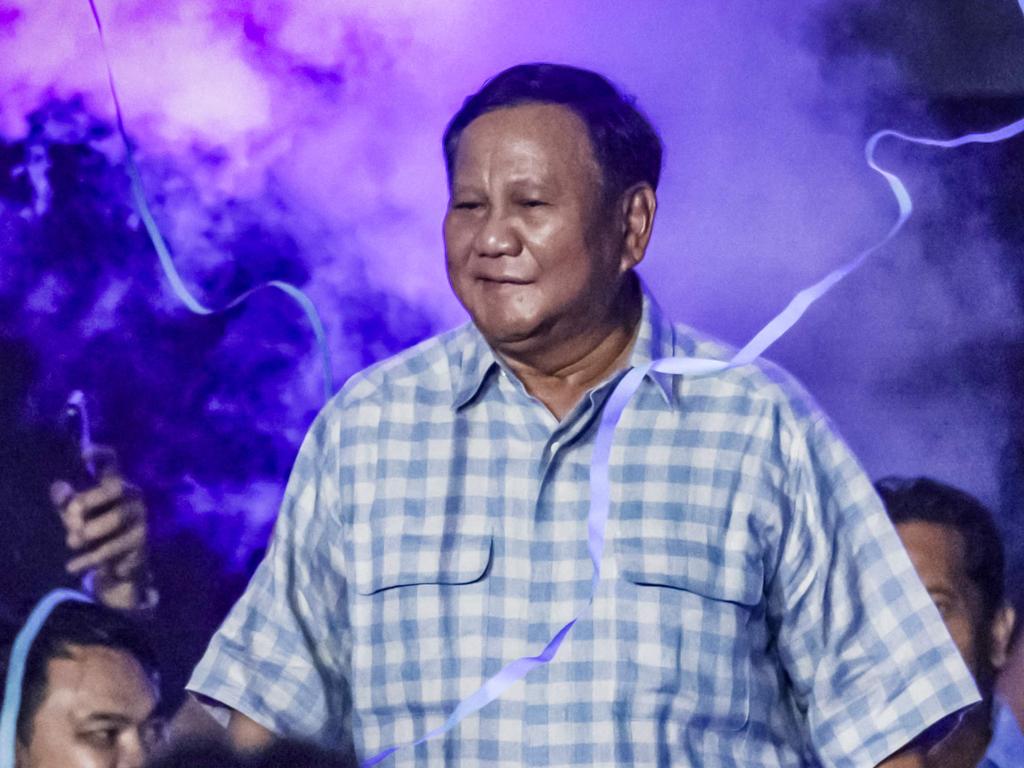Third time lucky for Prabowo, Indonesia’s next president
Prabowo Subianto, once banned from the US for human rights abuses and red-flagged by Australia, is set to become Indonesia’s next president.

Prabowo Subianto, a former general once banned from the US for human rights abuses and red-flagged by Australia, is set to become Indonesia’s next president after declaring victory following elections on Wednesday.
The 72-year-old cited reliable “quick count” results from Indonesian pollsters indicating he had secured a landslide that exceeded even his own team’s expectations on the back of a campaign which promised to continue the nation-building project of outgoing President Joko Widodo.
Formal election results from the General Election Committee will not be known until March, but, with 95 per cent of the vote tallied in exit polling, Prabowo had secured about 58 per cent of the vote by late Wednesday.
“This victory should be a victory for all Indonesians,” he told a jubilant crowd of supporters who packed central Jakarta’s Istoria Stadium after results indicated a decisive win.

The former Suharto-era general promised to assemble a government “consisting of the best sons and daughters of Indonesia” to help the country achieve its ambitions to become a high-income nation by 2045.
He also urged supporters not to be “arrogant”, and to remember that the time had come to reunite the country.
“We will embrace all groups. We will be president and vice-president for all Indonesians … wherever they come from, whatever their tribe, ethnicity, race or religion. Whatever their social or economic background,” he said.
Anthony Albanese was the first foreign leader to congratulate Prabowo on Thursday, saying in a social media post: “I look forward to working closely with the new Indonesian president once inaugurated in October 2024.”
Prabowo also received phone calls from Singapore PM Lee Hsien Long, Malaysian PM Anwar Ibrahim, Sri Lankan president Ranil Wickremesinghe and Defence Minister Richard Marles.
US State Department spokesman Matthew Miller congratulated Indonesians for their “robust turnout”.
“We look forward to working with Indonesia’s next president-elect and government … on the shared priorities that benefit the people of both countries,” he said.
At Wednesday night’s victory celebration, presumptive vice-president Gibran Rakabuming Raka – the son of the outgoing President — thanked Prabowo for giving young Indonesians a say, and for lifting him out of relative obscurity, notwithstanding his family’s political pedigree.
“I was a nobody three months ago. People called me names, and said I was too scared to participate in the election debates,” he said. “I thank Prabowo for giving young people a chance.”
At just 36 years old, Gibran – the first-term mayor of central Java’s Solo, where his father also began his political career – will be Indonesia’s youngest vice-president by some measure.
Laws had to be changed to allow him to contest high office which had previously been restricted to candidates over 40. His uncle, former chief justice of the Constitutional Court until an ethics committee demoted him, cast the deciding vote.
The court decision provoked outrage in some quarters, compounded by a perception that Jokowi was using state resources, and rolling out generous social assistance programs, to help his son and Defence Minister win the election.
Gibran’s selection has also raised questions over whether a political ingenue would be ready to take office in the event that Prabowo, whose health has been under a cloud, should become incapacitated – and what weight Jokowi might have given to such considerations in supporting his former rival.
While Prabowo has undertaken to continue Jokowi’s legacy projects and policies – including the new capital city Nusantara and more investment to develop an Indonesian electric vehicle manufacturing hub – many have also questioned how long that promise will last in light of his unexpectedly large win.
But ANU associate professor Marcus Mietzner said the size of the victory did not change the dynamics.
“Jokowi can claim that’s his victory, but Prabowo can equally point out that it was him who was on the ballot, so it’s his mandate. Like so much else, the result will be a matter of contestation between Prabowo and Jokowi.”
Prabowo has been a polarising figure in Indonesian public life for more than three decades; first as a feared special forces commander who was dismissed from the military in 1998 over allegations his unit kidnapped and tortured democracy activists, then as a fiery nationalist and quasi-political Islamist.
He has admitted to abducting 23 student activists in Jakarta but denied knowing anything about the 13 who were never found.
He was banned from the US for years over allegations of human rights abuses in East Timor, and was believed to have been red-flagged by Australian immigration until 2014 when he first contested the presidency.
He was twice defeated by Jokowi for high office, but both times refused to concede defeat, and after his second loss in 2019 called supporters onto the streets to protest what he alleged was widespread vote rigging.
Eight people died in the violence, yet six months later he joined Jokowi’s cabinet and has spent next five years rebranding.
His second-place election rival Anies Baswedan, who had promised to restore democratic institutions degraded under Jokowi’s transactional presidency and review his white elephant capital city project, said he would not concede defeat until the formal count was completed and vowed to continue his movement for change.
“Our struggle is not over,” he said at his campaign headquarters after his rival claimed victory.
A spokesman for Ganjar Pranowo, who polled a distant third with around 16 per cent of the vote, said his team had discovered “structured, systematic and massive” electoral fraud.
But Jokowi dismissed those allegations, pointing to levels of scrutiny at all polling stations, including the Election Supervisory Agency and monitors for each candidate.
“There are multiple layers of supervision so why is there talk of cheating?” he said outside an international motor show event in Jakarta on Thursday.
“Even if there is (cheating), there is a mechanism to report it, and a mechanism for a trial at the Constitutional Court.”
The outgoing leader said he had already congratulated the presumptive election winners but also urged Indonesians to “be patient” and wait for the formal results.
Additional reporting: Dian Septiari, Ben Packham





To join the conversation, please log in. Don't have an account? Register
Join the conversation, you are commenting as Logout